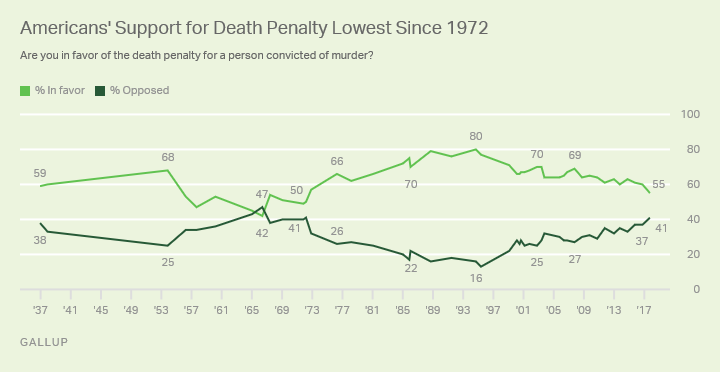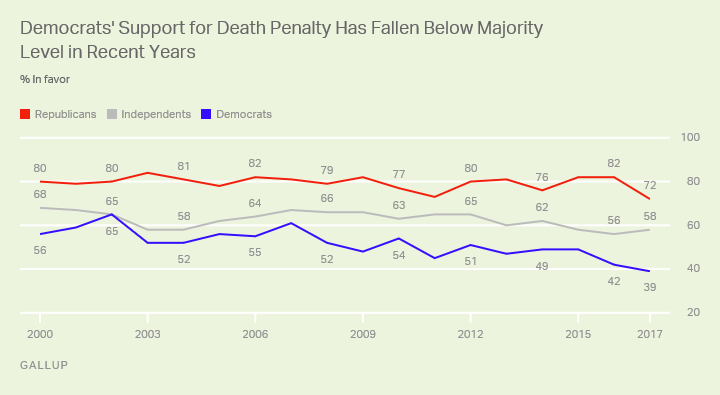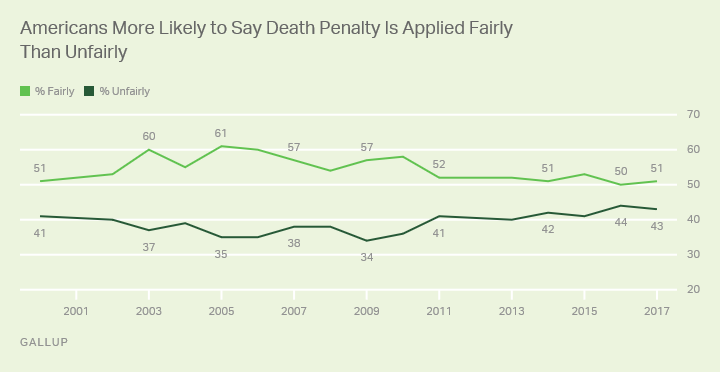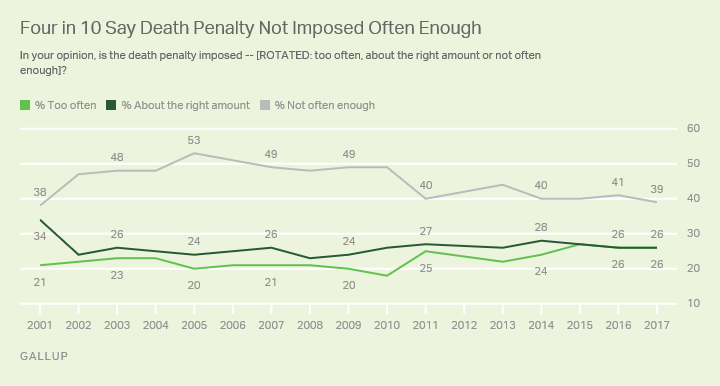Story Highlights
- 55% in favor of death penalty for convicted murderers
- Lowest since 50% in March 1972
- Democratic support consistently below majority level
WASHINGTON, D.C. -- Americans' support for the death penalty has dipped to a level not seen in 45 years. Currently, 55% of U.S. adults say they favor the death penalty for convicted murderers.

The latest results, based on an Oct. 5-11 Gallup poll, continue a trend toward diminished death penalty support as many states have issued moratoria on executions or abolished capital punishment.
Gallup first asked about the death penalty using the current question format in 1936. Support has generally been 60% or higher throughout most of the past 80 years, but has been as low as 42% and as high as 80%.
The low point came in 1966 during a period spanning the late 1950s through early 1970s when a series of court cases challenged the legality of capital punishment. This culminated with the Supreme Court's 1972 decision in Furman v. Georgia that halted all U.S. executions. Three months before that ruling, 50% of Americans said they favored the death penalty. Four months after it, 57% were in favor, the last time support was below 60%.
State legislatures responded to the Furman ruling by rewriting state laws to address the high court's concerns that the death penalty was not applied fairly. Those new laws were deemed constitutional, leading to the resumption of capital punishment in the late 1970s.
Death penalty support generally increased from the mid-1970s to the mid-1990s, peaking at 80% in 1994, a time when Americans named crime as the most important problem facing the nation.

Gallup Analytics
Subscribe to our online platform and access nearly a century of primary data.
Democrats Oppose, Republicans Favor Death Penalty
Most of the decline in death penalty support in recent years is attributable to a drop in support among Democrats. In the early 2000s, consistent majorities of Democrats favored capital punishment -- but their support has been below 50% in each of the past five years, including just 39% in the current poll.
In contrast, Republicans continue to largely back the death penalty, with typically around eight in 10 in favor of the practice, though slightly fewer, 72%, do so in the current poll.
Independents' support is similar to the national average, at 58%, but has been lower the past three years than it was in most of the previous two decades.

Slim Majority Say Death Penalty Applied Fairly
One of the major criticisms of capital punishment, and central to the Supreme Court's ruling in the Furman case, is that the law is not applied fairly. For example, racial and ethnic minority defendants are disproportionately more likely than white defendants to receive the death penalty. Overall, 51% of Americans believe the death penalty is applied fairly and 43% unfairly.
The percentage believing the death penalty is applied fairly has changed little in recent years, but it has been higher in the past, including 58% as recently as 2010. The high point in Gallup's trend on this question, first asked in 2000, was 61% in May 2005.

Currently, 39% of Americans say the death penalty is not imposed often enough, 26% say it is used too much, and 26% say its use is about right. Those views have been fairly steady in recent years but reflect a decline since 2010 in the percentage saying the death penalty is not used often enough. That decline has mostly been accompanied by an increase in the percentage saying it is used too often.

Attitudes about the fairness and usage of the death penalty correspond with basic support or opposition toward capital punishment more generally. Thus, the declines in recent years in the percentage of U.S. adults who say the death penalty is applied fairly or who are critical of how often it is used are largely related to the decline in basic death penalty support.
Implications
Americans' support for the death penalty is lower than it has been in over four decades. Fewer states now allow the death penalty than did so in the past, and the number of executions has declined in recent years.
Illinois' 2000 moratorium on executions may have been the turning point in U.S. death penalty policy. That year, Gov. George Ryan suspended the death penalty in Illinois after many death row inmates there were cleared of the crimes for which they were to be executed.
Since 2000, other states have followed suit with their own moratoria or have decided to abolish the death penalty entirely. Most of those states are Democratic-leaning, suggesting those actions are consistent with general views of the death penalty among state residents. Thirty-one states, primarily in Republican-leaning regions, allow the death penalty. The likelihood of many of those states changing their laws hinges on whether rank-and-file Republican support for capital punishment remains high or declines in the future.
Survey Methods
Results for this Gallup poll are based on telephone interviews conducted Oct. 5-11, 2017, with a random sample of 1,028 adults, aged 18 and older, living in all 50 U.S. states and the District of Columbia. For results based on the total sample of national adults, the margin of sampling error is ±4 percentage points at the 95% confidence level. All reported margins of sampling error include computed design effects for weighting.
Each sample of national adults includes a minimum quota of 70% cellphone respondents and 30% landline respondents, with additional minimum quotas by time zone within region. Landline and cellular telephone numbers are selected using random-digit-dial methods.
View survey methodology, complete question responses and trends.
Learn more about how the Gallup Poll Social Series works.




